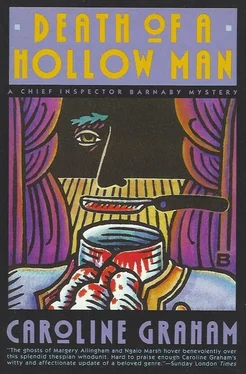Sunny, who had gone in for the most dashing leaps and runs when they were out, had already sensed the situation and now sat quietly at her feet. Deidre picked up her copy of Uncle Vanya , interleaved and crammed with production ideas and sketches for the set. One of the nicest things during her stay with the Barnabys had happened on Wednesday morning, when she had discussed the theater for hours with Cully, at first tentatively, then, as her companion responded with great interest, more and more enthusiastically. They had talked through lunch (extraordinarily inedible) and well into the afternoon, in fact right up to the time Deidre had had to leave for the hospital. She couldn’t understand now why she had ever thought Cully sneering and standoffish.
Sunny made a hopeful sound, stretching his lips in that strange manner that dogs have; half yawn, half grin. Deidre started guiltily. He had not eaten all day, and had made no complaint till now. There were three cans of meat and a large bag of Winalot in her bag, and she put some food on a plate, then filled his stone dish marked dog with clean water. She left the sound of steady lapping behind as she climbed the stairs.
In her father’s room she started automatically to make his bed, then stopped, sharply recalled to the complete pointlessness of her task. She looked around, a fall of green blanket in her arms, taking in the bottle of medicine and little bottles of pills on the bamboo table; the Bible open at the First Book of Kings showing an engraving of Elijah being delicately fed by ravens; two pieces of Turkish delight in a saucer.
Gradually, and with the deepest apprehension, she absorbed the full enormity of what had happened. Her father was not poorly or a little unstable or susceptible to queer turns. He had Alzheimer’s disease and was a danger to himself and others; the balance of his mind disturbed. Deidre had a sudden vision of some old-fashioned scales and an impersonal hand dishing out wholesome grains of sanity with a little brass scoop. They were white and clean like virgin sand. Into the other shallow metal saucer was poured a hot dark flux of irrationality until the saucer overflowed and the chaste pale granules were first swamped, then quite washed away, in the black froth of madness.
Deidre bowed her head. She swayed and momentarily fought for breath. But she did not sit down. And she did not cry. She stood for five full minutes in a tumult of misery and sorrow, then started to strip the bed and fold up the sheets and blankets. She opened the window and, as the cold air rushed in, realized for the first time how stuffy the room was. Fearful of her father’s health once October had arrived, she had kept the window tightly closed. “That’ll blow the cobwebs away,” he would say when she opened it again in May. Having put the bedding in a neat pile, Deidre picked up the wastebasket and swept all bottles into it together with his carafe and glass. The Bible she snapped shut and replaced on the bookshelf.
She worked mechanically, under no illusion that her activities could even begin to ease, let alone transform, her situation. But (the social worker had been right in this respect) as she continued to go briskly from one simple task to the next, generating her own momentum, she became aware that the procedure did offer some slight degree of comfort. And—even more important—was getting her though the period she had dreaded most, her first time alone in Mortimer Street.
She shook the two rugs in the backyard and noticed how threadbare the dark red-and-blue Turkish one was. She rolled it up and pushed it in the trash bin. Then she carried the bedding downstairs and put it by the front door. She would have the sheets washed, the blankets cleaned, and give the lot to the Salvation Army. She cleaned and polished for the next hour, until the room shone and smelled fragrantly of beeswax and Windowlene. She replaced the single mat and put Mr. Tibbs’s tortoiseshell hairbrush and comb and leather cuff-link box away in the chest of drawers. Then she leaned against the windowsill and sighed with something like satisfaction.
The room looked clean, neat, and would have appeared to a casual visitor quite impersonal. Deidre completed her task by dusting the pictures. Two Corot reproductions, a text (trust in the lord) garlanded with pansies and ears of wheat and framed in burnt pokerwood, and “The Light of the World.” Deidre flicked the dust from the first three while they were in situ , then took down the Holman Hunt and studied it pensively. The figure that had given comfort to her childish hurts and sorrows and had seemed to stand loving guard when she slept now appeared nothing more than a sentimental dreamer, a paper savior impotent and unreal, standing in his flood of insipid yellow light. She fought against the pity that always gripped her at the sight of the crown of thorns; she fought against insidious false comfort.
Running downstairs again, holding the picture away from her almost at arm’s length, Deidre hurried through the kitchen to the back garden and once more lifted the lid of the trash bin. She dropped “The Light of the World” inside and, replacing the cover, turned away immediately, as if that sad, calm, forgiving gaze might pierce the metal and catch her own. And she had no sooner gone back upstairs than the upbeat energy, the essential driving feeling that she was tackling a job well done, drained away. Now, looking at the poor denuded room with all traces of her father so firmly erased, Deidre was appalled. She was behaving as if he were dead. And as if his memory must always bring pain and never solace. She apologized aloud as if he could hear, and brought out his brush and comb and link box and replaced them on the bamboo table. Then she returned to the backyard and retrieved the painting.
She stood indecisive and shivering in the cold air, with “The Light of the World” in her hands. She did not want to take it back inside, but felt now that it was out of the question that it should be destroyed. In the end she put it in the shed, placing it carefully on an old enamel-topped table beside the earth-encrusted flowerpots, balls of green twine, and seed trays. She closed the door gently as she left, not wishing to advertise her presence and invoke Mrs. Higgins.
Deidre had only seen her neighbor once since Monday evening, when she had called in briefly to collect any mail. Mrs. Higgins had been all agog with many a “fancy” and “poor Mr. Tibbs—out of the blue like that.” Deidre had reacted tersely. “Out of the blue” had seemed to her an especially fatuous remark. Terrible things surely came out of the gray, or out of a deep, transforming black. At the realization that there would be no more little envelopes or lugubrious sighs and miserable forecasts when she arrived home from the Latimer, Deidre’s spirits lifted once more.
She returned to the kitchen, where Sunny, curled up in front of an empty grate, immediately got up and ran to meet her. She crouched down and buried her face in his sparkling cream and ginger ruff. Glancing at the mantelpiece, she realized there were three hours before she needed to leave for the Chekhov auditions. How slowly the clock seemed to be ticking. Of course, there was plenty to do. All those dishes, for a start. Perhaps Sunny might like another walk. And she still hadn’t unpacked her case. It occurred to Deidre suddenly how much time there seemed to be when you were unhappy. Perhaps this leaden comprehension that each minute must last for at least an hour was what people meant by loneliness. Time turning inward and then standing still. Well—she’d just have to get used to it and soldier on. She was turning on the hot-water faucet when the doorbell rang.
She decided not to go. It was probably one of her father’s so-called friends who had heard the news and, after cutting him dead for the past eighteen months, was now calling to see if there was anything he could do. Or Mrs. Higgins, dewlaps aquiver with curiosity. It wouldn’t be the Barnabys. Although warmly pressing her to stay, Joyce had left it that Deidre would get in touch if she wanted any further help. The bell rang again, and Sunny started to bark. Deidre dried her hands. Whoever it was, was not going away. She opened the front door. David Smy stood on the step clutching a bunch of flowers.
Читать дальше












